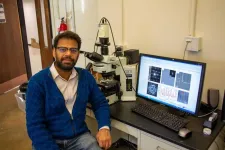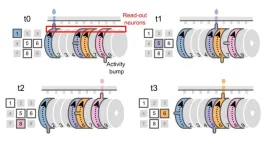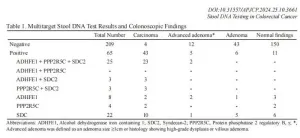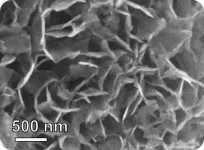(Press-News.org) About The Study: This retrospective cohort study with an extended follow-up period found associations between COVID-19 and the long-term risk of various autoimmune and autoinflammatory connective tissue disorders. Long-term monitoring and care of patients is crucial after COVID-19, considering demographic factors, disease severity, and vaccination status, to mitigate these risks.
Corresponding Author: To contact the corresponding author, Solam Lee, MD, PhD, email solam@yonsei.ac.kr.
To access the embargoed study: Visit our For The Media website at this link https://media.jamanetwork.com/
(doi:10.1001/jamadermatol.2024.4233)
Editor’s Note: Please see the article for additional information, including other authors, author contributions and affiliations, conflict of interest and financial disclosures, and funding and support.
# # #
Embed this link to provide your readers free access to the full-text article This link will be live at the embargo time https://jamanetwork.com/journals/jamadermatology/fullarticle/10.1001/jamadermatol.2024.4233?guestAccessKey=c58e0ba8-9aa0-457e-a4e7-c043439b3e52&utm_source=for_the_media&utm_medium=referral&utm_campaign=ftm_links&utm_content=tfl&utm_term=110624
END
Long-term risk of autoimmune and autoinflammatory connective tissue disorders following COVID-19
JAMA Dermatology
2024-11-06
ELSE PRESS RELEASES FROM THIS DATE:
Mount Sinai researchers have uncovered the mechanism in the brain that constantly refreshes memory
2024-11-06
Mount Sinai researchers have discovered for the first time a neural mechanism for memory integration that stretches across both time and personal experience. These findings, reported in Nature, demonstrate how memories stored in neural ensembles in the brain are constantly being updated and reorganized with salient information, and represent an important step in deciphering how our memories stay current with the most recently available information. This discovery could have important implications for better understanding adaptive memory processes ...
Breakthrough in energy-efficient avalanche-based amorphization could revolutionize data storage
2024-11-06
The atoms of amorphous solids like glass have no ordered structure; they arrange themselves randomly, like scattered grains of sand on a beach. Normally, making materials amorphous — a process known as amorphization — requires considerable amounts of energy. The most common technique is the melt-quench process, which involves heating a material until it liquifies, then rapidly cooling it so the atoms don’t have time to order themselves in a crystal lattice.
Now, researchers ...
Scientists discover how specific E. coli bacteria drive colon cancer
2024-11-06
Ghent, 7 November 2024 – Scientists have uncovered how certain E. coli bacteria in the gut promote colon cancer by binding to intestinal cells and releasing a DNA-damaging toxin. The study, published in Nature, sheds light on a new approach to potentially reduce cancer risk. The study was performed by the teams of Prof. Lars Vereecke (VIB-UGent Center for Inflammation Research) and Prof. Han Remaut (VIB-VUB Center for Structural Biology).
Bacteria and colon cancer
Colon cancer ranks as the third most prevalent and deadliest type of cancer. Alarmingly, its incidence is rising, particularly ...
Brain acts like music box playing different behaviours
2024-11-06
Neuroscientists have discovered brain cells that form multiple coordinate systems to tell us “where we are” in a sequence of behaviours. These cells can play out different sequences of actions, just like a music box can be configured to play different sequences of tones. The findings help us understand the algorithms used by the brain to flexibly generate complex behaviours, such as planning and reasoning, and might be useful in understanding how such processes go wrong in psychiatric ...
Study reveals how cancer immunotherapy may cause heart inflammation in some patients
2024-11-06
Some patients being treated with immune checkpoint inhibitors, a type of cancer immunotherapy, develop a dangerous form of heart inflammation called myocarditis. Researchers led by physicians and scientists at the Broad Institute of MIT and Harvard and Massachusetts General Hospital (MGH), a founding member of the Mass General Brigham healthcare system, have now uncovered the immune basis of this inflammation. The team identified changes in specific types of immune and stromal cells in the heart that underlie myocarditis and pinpointed factors in the blood that may indicate ...
More families purchased school meals after federal nutrition policies enacted
2024-11-06
Families purchased more school lunches and breakfasts the year after the federal government toughened nutritional standards for school meals. A new University of California, Davis, study suggests that families turned to school lunches after the Obama administration initiative was in effect to save time and money and take advantage of more nutritious options.
Researchers looked at the purchasing habits of nearly 8,000 U.S. households over two years — one year before and after the change in standards. The results have important implications for policymakers and researchers, but also food manufacturers and retailers, researchers said.
The study, ...
Research proves stool DNA as non-invasive alternative for colorectal cancer screening in Thailand
2024-11-06
A recent prospective cross-sectional study in Thailand demonstrates that multitarget stool DNA testing is highly sensitive and specific for detecting colorectal cancer (CRC) among Thai individuals. Researchers believe that this testing method could serve as a viable non-invasive alternative to colonoscopy, especially in settings where colonoscopy is less accessible or less accepted by patients.
This study was conducted by BGI Genomics in 2023, in collaboration with Professor Varut Lohsiriwat’s team from the Faculty of Medicine, Siriraj Hospital, Mahidol University, Thailand. ...
Detecting evidence of lung cancer in exhaled breath
2024-11-06
Exhaled breath contains chemical clues to what’s going on inside the body, including diseases like lung cancer. And devising ways to sense these compounds could help doctors provide early diagnoses — and improve patients’ prospects. In a study in ACS Sensors, researchers report developing ultrasensitive, nanoscale sensors that in small-scale tests distinguished a key change in the chemistry of the breath of people with lung cancer. November is Lung Cancer Awareness Month.
People breathe out many gases, such as water vapor and carbon dioxide, as well as other airborne compounds. Researchers ...
A joint research team of Korea University College of Medicine announced the world's first single-port robotic thymectomy comparative results
2024-11-06
A Joint research team (Prof. Jun-hee Lee, Hyun-koo Kim, Jin-Wook Hwang, Jae-Ho Chung, the Department of Thoracic and Cardiovascular Surgery, Korea University College of Medicine) Announced the world's first compartive results of single-port robotic thymectomy using the single-port robotic system.
The team compared and analyzed the perioperative outcomes of 110 cases of robotic thymectomy using the single-port robotic system and conventional video-assisted thoracic surgery(VATS) thymectomy from November 2018 to May 2024. The results showed that all robotic thymectomy performed were successfully ...
National Mental Health Institute awards CAD 45 million to develop mental health treatments
2024-11-06
One out of 100 people will experience a psychotic episode in their lifetime, and these usually appear in late adolescence or early adulthood. A Canada-US team consisting of Sylvain Bouix, from École de technologie supérieure (ÉTS), Martha E. Shenton and Ofer Pasternak, from the Brigham and Women’s Hospital (Harvard University), and René Kahn, from Mount Sinai Hospital (New York) has just received US $33 million in funding—the equivalent of CAD 45 million—over five years from the National Institute of Mental Health ...
LAST 30 PRESS RELEASES:
Scientists show how to predict world’s deadly scorpion hotspots
ASU researchers to lead AAAS panel on water insecurity in the United States
ASU professor Anne Stone to present at AAAS Conference in Phoenix on ancient origins of modern disease
Proposals for exploring viruses and skin as the next experimental quantum frontiers share US$30,000 science award
ASU researchers showcase scalable tech solutions for older adults living alone with cognitive decline at AAAS 2026
Scientists identify smooth regional trends in fruit fly survival strategies
Antipathy toward snakes? Your parents likely talked you into that at an early age
Sylvester Cancer Tip Sheet for Feb. 2026
Online exposure to medical misinformation concentrated among older adults
Telehealth improves access to genetic services for adult survivors of childhood cancers
Outdated mortality benchmarks risk missing early signs of famine and delay recognizing mass starvation
Newly discovered bacterium converts carbon dioxide into chemicals using electricity
Flipping and reversing mini-proteins could improve disease treatment
Scientists reveal major hidden source of atmospheric nitrogen pollution in fragile lake basin
Biochar emerges as a powerful tool for soil carbon neutrality and climate mitigation
Tiny cell messengers show big promise for safer protein and gene delivery
AMS releases statement regarding the decision to rescind EPA’s 2009 Endangerment Finding
Parents’ alcohol and drug use influences their children’s consumption, research shows
Modular assembly of chiral nitrogen-bridged rings achieved by palladium-catalyzed diastereoselective and enantioselective cascade cyclization reactions
Promoting civic engagement
AMS Science Preview: Hurricane slowdown, school snow days
Deforestation in the Amazon raises the surface temperature by 3 °C during the dry season
Model more accurately maps the impact of frost on corn crops
How did humans develop sharp vision? Lab-grown retinas show likely answer
Sour grapes? Taste, experience of sour foods depends on individual consumer
At AAAS, professor Krystal Tsosie argues the future of science must be Indigenous-led
From the lab to the living room: Decoding Parkinson’s patients movements in the real world
Research advances in porous materials, as highlighted in the 2025 Nobel Prize in Chemistry
Sally C. Morton, executive vice president of ASU Knowledge Enterprise, presents a bold and practical framework for moving research from discovery to real-world impact
Biochemical parameters in patients with diabetic nephropathy versus individuals with diabetes alone, non-diabetic nephropathy, and healthy controls
[Press-News.org] Long-term risk of autoimmune and autoinflammatory connective tissue disorders following COVID-19JAMA Dermatology






